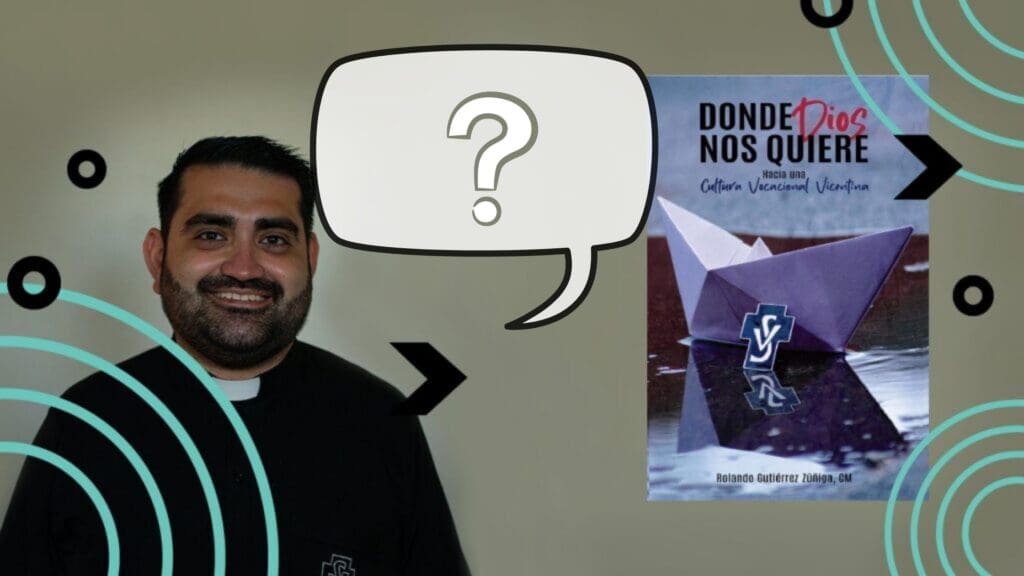
I think that a variety of very significant Vincentian books are appearing recently. I don’t know if there are more of them than a few years ago, or if it’s only my feeling, but what it seems to me they cover very timely topics. They do not only look at the past, but they try to illuminate the present with the experience of the beginnings.
It seems interesting to me, as a missionary, that I could make a reflection on some of these themes, on some of these works. I understand this is what many of us do when we read the book. But it seems to me even more interesting if I can make a reflection together with the author, a dialogue deepening the reflection, making it shared, open to criticism and the input of other points of view. For this reason we have come up with the idea of creating this “dialogue with the author” section. In it we intend to write our own opinion in reference to a work, to some of its aspects, and that the author has the opportunity to respond, to answer, to explain, to deepen.
I want to begin this dialogue with the Vincentian missionary Rolando Gutiérrez Zúñiga, about his work “Where God wants us. Towards a Vincentian Culture of Vocations”.
The author maintains, we believe very correctly, the culture of vocations is composed of three dimensions. A mentality, a cognitive dynamism, “we refer to the principles and convictions that sustain a system of values on which a whole culture is built” (p. 80). A sensitivity, an affective dynamism, which “is the passage from objective principles or values (so it should be) to the subjective value (so I feel it) of those convictions” (p. 82). And a pedagogy, a practical dynamism, “the personal involvement of the subjects of a given group that develops a lifestyle around a common project” (p. 80). In other words, living a Vincentian culture of vocation implies a way of thinking, a way of feeling and a way of acting.
The second part of the book focuses on the explanation of these three dimensions. A first part is centered on the current reality of the world, the Church, the Congregation and vocations within them. The third part of the book develops and concretizes the third dimension of the vocation culture, the Vincentian vocational pedagogy: “With these elements we have established a parallelism between the vocational proposal of Pope Francis and the actions of St. Vincent de Paul in the 1617 foundation events, giving rise to a Vincentian vocational pedagogy which expresses itself in three actions: to go out, to see and to call. In the third part, we are going to use these three verbs to weave an itinerary that offers us the guidelines that help to build a Vincentian Culture of Vocations” (p. 149).
According to this, I understand the author gives priority to the dimension of pedagogy in order to build a culture of vocations. So to simplify it: if we do Vincentian things, if we live a Vincentian lifestyle, our way of thinking and feeling will be transformed, we will be able to think and feel in a Vincentian way. No doubt, this is the case in many aspects of life. We will all have experience of doing something that, at first, we did not think or feel was good for us, but by doing it, we have ended up thinking and feeling favorably towards it; or dealing with a person we did not value positively, and being with them and dealing with them, has changed our thinking and feeling more positively towards them.
If I look at the reality of the Congregation, of my Province, from the perspective of the Vocation Culture, analyzed through its three dimensions, I will see there are realities in which what is lacking is the way of thinking, others in which we fail in the way of feeling, and others in which what we do is not Vincentian. I will give two examples taken from the answers of my Province to the questionnaire for the General Assembly, according to my personal vision:
- Spiritual life: all the communities should have organized times of prayer, of celebration of the Eucharist, of retreats on the special times (Tempos Fortes). Most of the missionaries pray daily, celebrate the Eucharist, participate in the annual retreats… That is to say, our work is adequate and Vincentian. But the missionaries confirm: “Christ must be the center of our life and mission. We recognize the difficulties we have in achieving this goal by living our spirituality without depth, in a disincarnated way and far from the poor. The Eucharist and prayer are important in our life, but we find that we often do not live them in depth. We need to motivate ourselves to motivate newcomers and encourage those already in formation and vocation ministry.” It seems that, even though we have a Vincentian way of doing things, our feelings do not accompany it, we feel without depth, without incarnation, without motivation. What is wrong?
- Our ministry with the poor: all the missionaries know our charism well, they have clarity about our mission as evangelizers of the poor, they think the poor are our lords and masters. But they realistically note that “in many of our communities there is no direct service to the poor. In social action we focus on parish Caritas with assistance activities and not on a true evangelizing action among the poor.” It seems that in this matter we think clearly, but we fail to do what we do, which is not Vincentian. How can we solve it?
I hope this little reflection will be a challenge to Fr. Rolando to help him to reflect, to go deeper and to be able to offer me (us) some answers to these questions.
Bro. Francisco Berbegal Vázquez, C.M.

